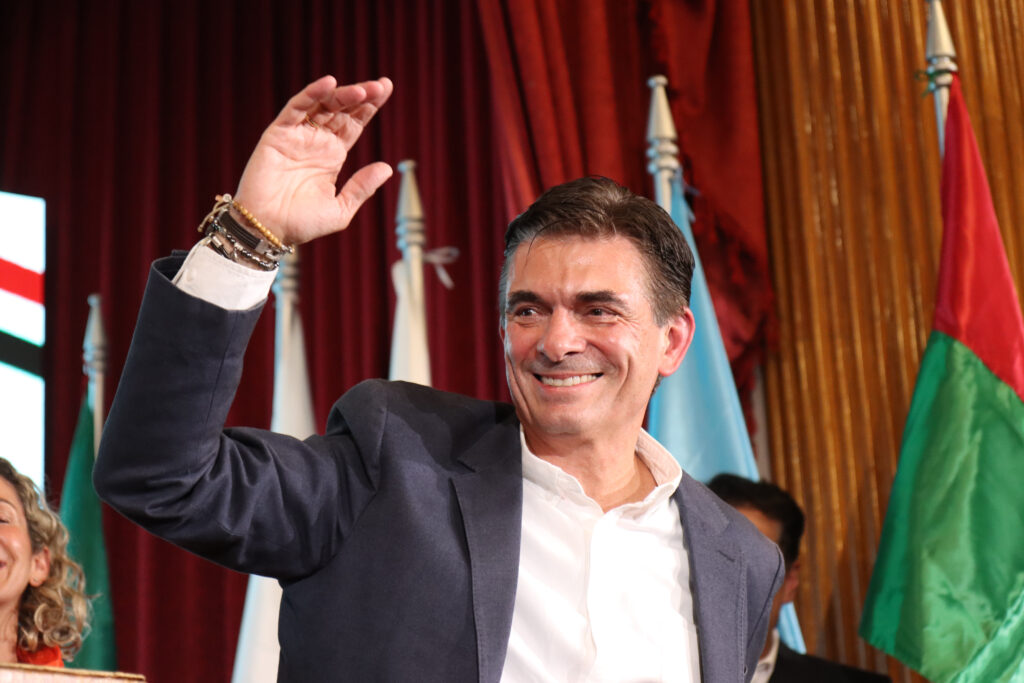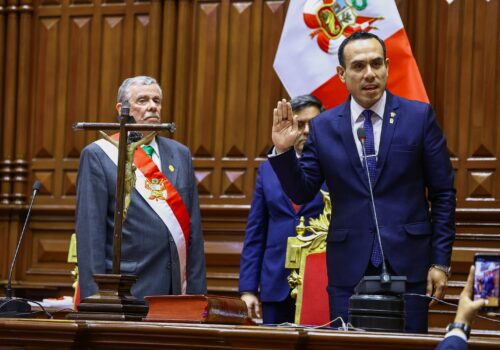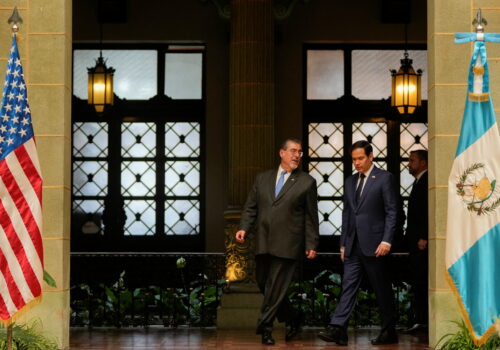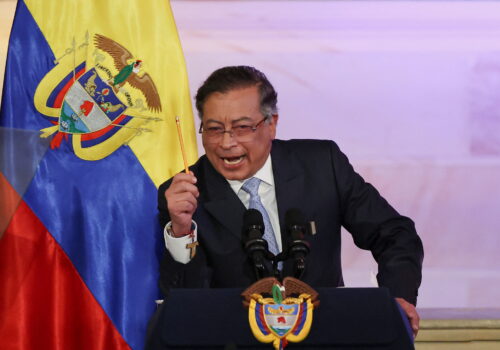Bolivian politics underwent a massive shift on Sunday, as voters ended nearly two decades of left-wing rule by electing Rodrigo Paz Pereira of the Christian Democratic Party as president.
Primarily driven by a major economic crisis and distrust with the incumbent Movimiento al Socialismo (MAS) party, Bolivians have joined a regional shift away from leftist leadership. Yet, unlike the populist pendulum swings seen in neighboring Argentina and El Salvador, Bolivians appear to have chosen a more centrist and reformist path, rather than a far-right approach.
As Paz begins his five-year presidential term on November 8, expect to see shifts in the country’s approach to the economy, foreign policy, and security.
Who is Paz and why did he win?
Paz was born in exile in Spain. Son of former president Jaime Paz Zamora, he studied in Washington and was elected senator from Tarija, and later mayor of the city. Edman Lara, Paz’s running mate, also drew in support. A former police officer, he first made headlines in 2024 for calling out corruption within Bolivia’s law enforcement, leading to his removal.
Paz’s win comes after the incumbent MAS party lost the first-round elections on August 17. For the past two decades, MAS was one of South America’s most prominent parties under former President Evo Morales and then under incumbent President Luis Arce. But over time, Bolivians’ support for the party has waned as the country has dealt with economic crises and prominent MAS members have been implicated in scandals.
The rivalry between Arce and Morales fractured the MAS party, further damaging its electoral chances. Arce, suffering from some of the region’s lowest approval ratings, declined to run for reelection, claiming he didn’t want to further divide the vote and help a “right-wing candidate win.” His withdrawal ultimately contributed to the party’s collapse and Morales, who is term-limited from running for president again, motivated his followers to cast null votes to protest his absence from the ballot. In the first round, about 20 percent of votes were null. This signified somewhat diminished support for Morales, though the null ballots made up a much larger vote share than the MAS’s official candidate, Eduardo del Castillo.
The MAS party has also been hurt by scandals involving its members. For instance, in September, Felipe Cáceres, Bolivia’s former vice-minister of social defense and controlled substances under Morales, was detained after anti-narcotics authorities found a cocaine laboratory on his property. Cáceres’ arrest raised questions about potential links between Morales’s partners and connections to drug trafficking.
What might Paz mean for Bolivia’s economy?
Bolivia faces a major economic crisis and gas shortages that will require steady attention from the new administration. Annual inflation has reached 24 percent, and international reserves have plunged from around fifteen billion dollars in 2014 to under two billion dollars in 2024.
Paz’s campaign slogan was “capitalism for everyone,” promising to open markets while maintaining welfare programs. During the campaign, he spoke about his plans to secure US fuel supplies to stabilize the economy and appoint an envoy to strengthen US-Bolivia trade. He has met with US officials and oil and gas companies, arguing that these sources of supply would ease shortages that accelerated inflation and reduced production.
One issue to watch is lithium. Nearly 21 million metric tons of lithium reserves lie in the nation, giving Bolivia the opportunity to become a critical supplier in the global energy transition. The metal is also important for defense, technology, and telecommunications applications in global supply chains. Arce’s government signed several lithium deals with Chinese and Russian firms in the past two years, but progress has been slow and the terms of the contracts are opaque. Paz has said his administration would review these contracts, as well as enact a new law on lithium mining to improve environmental oversight and strengthen support for local workers. If done properly, it could open investment opportunities for Western and regional partners. These reforms may eventually help transform Bolivia from a state-run extractive economy to an important member of the clean energy supply chain.
How might Bolivia’s foreign policy change?
It is likely that a new diplomatic language will emerge from La Paz. In contrast to the outgoing MAS government’s support for the Maduro regime in Venezuela, Paz has said he would suspend, though not totally sever, ties with Caracas. For decades, Bolivia was one of Venezuela’s major political allies and this change could begin to reshape the political dynamics of the Latin American left. In addition, the United States may now have an opportunity to rebuild a partnership in the Andes to advance mutual commercial interests and fight against narcotrafficking.
As Bolivia is likely to strengthen ties with the United States and other South American countries such as Ecuador, Brazil, and Argentina, expect the country’s relations with Cuba and Iran to diminish. Nevertheless, the foreign ministry remains likely to prioritize pragmatism when it comes to trade and regional cooperation.
How might Bolivia’s approach to security change?
As Bolivia is a key transit route and supplier in the cocaine trade, the new administration may prioritize combating illicit markets by revitalizing intelligence sharing and cooperation with regional partners.
It’s expected that Paz will work to reduce crime by promoting rehabilitation and reintegration programs. He has also signaled that we would work to restore counternarcotics partnerships with the United States, an approach that Washington seems to welcome. On October 19, US Secretary of State Marco Rubio stated that the “United States stands ready to partner with Bolivia” on issues such as “combatting transnational criminal organizations to strengthen regional security.”
Although public trust in institutions is low, security is a top issue for Bolivians, and the new administration has an opportunity to make strides in this area. For years, the judiciary and law enforcement networks have undermined rule of law through politicization, but Paz’s administration could take steps to modernize the country’s justice system. Whether these initiatives succeed in combating corruption and promoting transparency will help determine whether Bolivia’s new chapter is structural shift or merely rhetorical one.
If Paz’s government can deliver greater economic resilience, institutional trust, and innovative foreign partnerships, Bolivia could emerge as an example of centrist stability in a region often viewed as turbulent. However, the new administration should take a slow and steady approach, as avoiding sudden shocks will be essential for Paz to maintain his mandate for reform.
Miguel Escoto is a young global professional with the Atlantic Council’s Adrienne Arsht Latin America Center.
Further reading
Fri, Oct 10, 2025
Four questions (and expert answers) about Peru’s presidential impeachment and what’s next
New Atlanticist By
Peruvian President Dina Boluarte has been removed from office following a vote in Congress, with legislator José Jerí replacing her as president.
Fri, Sep 26, 2025
Guatemala’s Puerto Quetzal project can become a model of US engagement in the Americas
New Atlanticist By Isabella Palacios, Jose Echeverría
The modernization of Puerto Quetzal is part of a broader US strategy to deepen economic ties with reliable partners in Central America.
Tue, Sep 2, 2025
Take Colombia’s risk of democratic backsliding under Petro seriously
New Atlanticist By Enrique Millán-Mejía, Geoff Ramsey
Recent statements and proposals from Colombian President Gustavo Petro have raised concerns that his administration could spark a constitutional crisis.
Image: October 19, 2025, La Paz, La Paz, Bolivia: Center-right senator and presidential candidate for the Christian Democratic Party (PDC), Rodrigo Paz, celebrates his preliminary victory in Bolivias presidential runoff election. © Diego Rosales/ZUMA Press Wire.



